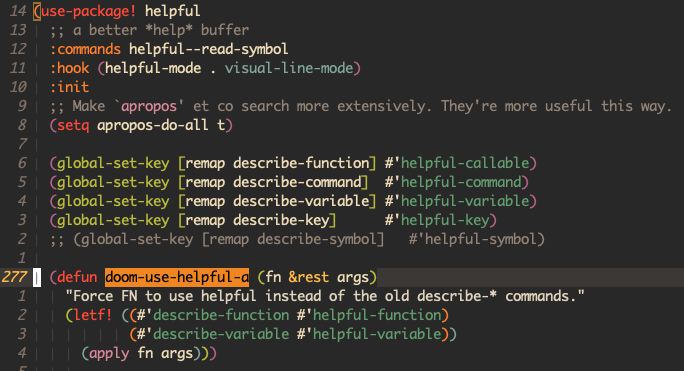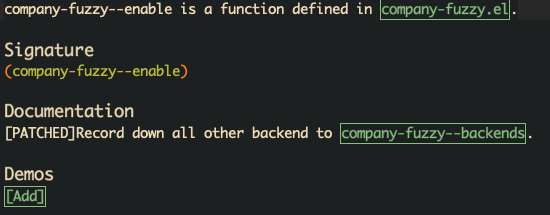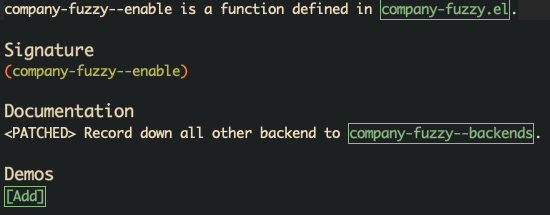Deeson
21
比如在包 doom-modeline 中,函数 doom-modeline-segment--matches 是通过下面这个宏定义的:
(doom-modeline-def-segment matches
"Docstring"
(let ((meta (concat (doom-modeline--macro-recording)
(doom-modeline--anzu)
(doom-modeline--phi-search)
(doom-modeline--evil-substitute)
(doom-modeline--iedit)
(doom-modeline--symbol-overlay)
(doom-modeline--multiple-cursors))))
(or (and (not (string-empty-p meta)) meta)
(doom-modeline--buffer-size))))
我的 patch 代码没有什么特别,比如,就使用:
(psearch-patch doom-modeline-segment--matches
(psearch-replace '`meta
'`meta_))
但最终的结果是:并没有重新定义 doom-modeline-segment--matches 这个函数,而是定义了一个新的函数 doom-modeline-segment--doom-modeline-segment--matches,而这,就是问题所在。
我明白了。
问题虽然已经明了,但是解决起来有点麻烦。
普通函数和 doom-modeline-def-segment 生成的函数是不一样的:
(psearch-patch--find-function 'doom-modeline-segment--foobar)
;; => (doom-modeline-def-segment foobar "Docstring" body...)
;; | | | |
;; | | | `--- [3]函数体
;; | | `------------ [2]文档
;; | `---------------------- [1]函数名
;; `------------------------------------ [0]声明符
(psearch-patch--find-function 'foobar)
;; => (defun foobar nil "Docstring" body...)
;; | | | | |
;; | | | | `--- [4]函数体
;; | | | `------------ [3]文档
;; | | `-------------------- [2]参数表
;; | `-------------------------- [1]函数名
;; `-------------------------------- [0]声明符
从以上对比可以看出,doom-modeline-def-segment 定义函数是没有参数列表的,所以它的 Docstring 位置和 defun 定义的函数不一样:
而且这个不一样还是 doom-modeline-def-segment 独有的, 换个其它 xxx-def-yyy 有可能就不一样了。有的可能需要参数列表,有的可能不需要 Docstring。这就导致其生成的结构无法预料。
需要有一种方法,可以让用户指定如何解析 def 生成的结构,这无疑会给用户增加负担。还要考虑到不改变 psearch-patch 的声明格式,不影响旧的 patch 代码,或许可以在外层套个 let:
(let ((psearch-patch-symbol-definition-pospec
'((symbol-name . 1)
(docstring . 2))))
(psearch-patch doom-modeline-segment--matches
(psearch-replace '`meta
'`meta_)))
让我再想一想,有可能指定一个 (let ((psarch-patch-docpos 2)) ...) 就够了。
1 个赞
Deeson
23
真是很漂亮、精确和简洁的解释!没有认真读过前辈的代码,但是通过这个回答,学到了不少!
再次感谢这个很实用的工具!
同时,我有两个不太相关的小问题:
- 这部分的注释,是怎么排版成这种“图形化”的纯字符呢?有什么小工具吗?
- 我之所以会尝试使用如下“看似没用”的代码:
是因为,我 patch 了 doom-modeline--multiple-cursors 这个函数(它是用 defsubst 定义的),并且被 doom-modeline-segment--matches 调用。
但是仅仅做这个 patch 没有效果(是因为内联?还是 Doom Emacs 的黑魔法?),并且我发现,只要我重新求值一下 doom-modeline-segment--matches 的定义,就有效果了。(并且先 patch 和先重新求值皆可)
这才有了我上面这个“看似没用”的代码。但最终我是通过这个代码来强制重新求值的:
(eval (psearch-patch--find-function 'doom-modeline-segment--matches))
所以,前辈有遇到类似的情况吗?有相关原因和更漂亮的解决方案吗?
手打,没工具。
内联。
最新版本 Add support for macro-generated function · twlz0ne/psearch.el@b027a9d · GitHub 应该可以支持 doom-modeline-segment 函数了,用法:
(let ((psearch-patch-function-definition-docpos 2))
(psearch-patch doom-modeline-segment--matches
(psearch-replace '`MATCH-PATTERN
'`REPLACEMENT)))
1 个赞
Deeson
26
我尝试这个版本发现,可以 patch defun 定义的函数,但是无法 patch defsubst 定义的函数呢(该提交之前,patch 功能是正常的)。
所以是不是把 defsubst 考虑进去比较好:
@@ -797,7 +797,7 @@
`(let ((func-def (psearch-patch--find-function ',orig-func-spec)))
(with-temp-buffer
;; Modifiy function name
- (when (and (eq 'defun (nth 0 func-def)) (not (eq ',name (nth 1 func-def))))
+ (when (and (memq (nth 0 func-def) '(defun defsubst)) (not (eq ',name (nth 1 func-def))))
(setcdr func-def (cons ',name (nthcdr 2 func-def))))
(print func-def (current-buffer))
;; Modify docstring.
@@ -805,7 +805,7 @@
(down-list)
(forward-sexp
(+ ,docpos (if (equal 'lambda (sexp-at-point)) 0
- (if (memq (sexp-at-point) '(defun cl-defgeneric cl-defmethod)) 1
+ (if (memq (sexp-at-point) '(defun defsubst cl-defgeneric cl-defmethod)) 1
0))))
(let ((str "[PATCHED]"))
(goto-char (car (bounds-of-thing-at-point 'sexp)))
LdBeth
27
defubst 本身就算改了定义也没法反映到已经编译的函数里,没啥做的意义
Deeson
28
是这样的,但是有时候确实需要改动一些内联函数,所以我会把某些受影响的函数重新求值一下(假设 FUN 调用了某个被 patch 的内联函数):
(eval (psearch-patch--find-function 'FUN))
能否提一个pr?同时记得修改一下头注释把你的名字加上去:
;; Last-Updated: <当下的时间戳>
;; By: <你的名字>
Deeson
32
我发现使用 psearch-patch 之后,就无法再用 elisp-def 定位到函数之前的位置了。
所以我对 psearch-patch-define 做了一些修改:在重新评估 patch 之后的函数体前,先设置好之前的路径。这样 patch 之后,也能找到函数的位置。
(带来的另外一个好处是,可以一边修改 psearch-replace 的内容,一边反复执行 psearch-patch,这在之前直不行的,因为运行一次 psearch-patch,就找不到函数的位置了,也就拿不到原来的定义了)
@@ -817,7 +817,8 @@ See `psearch-patch' for explanation on arguments ORIG-FUNC-SPEC and PATCH-FORM."
;; Apply patch
(goto-char (point-min))
(if (progn ,@patch-form)
- (eval-region (point-min) (point-max))
+ (let ((buffer-file-name (file-name-sans-extension (cdr (find-function-library ',name 'lisp-only t)))))
+ (eval-region (point-min) (point-max)))
(signal 'psearch-patch-failed
(list ',orig-func-spec "PATCH-FORM not applied")))))))
请前辈看看有没有什么问题和建议?
Deeson
34
嗯嗯好的!我确实没有经过广泛的测试,目前我的几个使用场景倒是没出啥问题。
Deeson
35
我自己尝试测试了一下 psearch-test 里面的代码,发现即使不引入我的修改,似乎也有测试不通过的例子?(在 psearch-test-cl-function-patch-1 aborted),是我打开方式不对吗? 
- 用 run-test.sh 脚本测试。
- 我做了一些改动,把错误消除了,你可以用它提一个 pr,记得改一下
Last-Updated: 时间并签上你的名字:
diff --git a/psearch.el b/psearch.el
index b77f659..6bbc683 100644
--- a/psearch.el
+++ b/psearch.el
@@ -817,7 +817,11 @@ See `psearch-patch' for explanation on arguments ORIG-FUNC-SPEC and PATCH-FORM."
;; Apply patch
(goto-char (point-min))
(if (progn ,@patch-form)
- (eval-region (point-min) (point-max))
+ (let* ((lib (cdr (condition-case nil
+ (find-function-library ',name 'lisp-only t)
+ (void-function nil))))
+ (buffer-file-name (if lib (file-name-sans-extension lib))))
+ (eval-region (point-min) (point-max)))
(signal 'psearch-patch-failed
(list ',orig-func-spec "PATCH-FORM not applied")))))))
好的,我刚刚创建了一个 PR,请前辈看看,有问题只管修改就行。
有时候,patch 的函数在源文件中,并不是顶格的  :
:
比如 Doom Emacs 中就有很多的 hack 是这种形式:
 这个
这个 doom-use-helpful-a 就不是顶格的。
如果我想通过 psearch-patch 对上面的函数进行 hack,就会报错:
原因是因为:psearch-patch--xref-function-def 这个函数只能定位到「函数定义位置的行首」(上图光标所在位置),这个时候 (bounds-of-thing-at-point 'sexp) 就会返回 nil,从而报错。
因此,建议:
diff --git a/psearch.el b/psearch.el
index 316c8b7..118d74c 100644
--- a/psearch.el
+++ b/psearch.el
@@ -683,6 +683,7 @@ Examples:
(`(,buf . ,pos) (find-function-search-for-symbol fun type file)))
(with-current-buffer buf
(goto-char pos)
+ (skip-chars-forward " \t")
(let ((bounds (bounds-of-thing-at-point 'sexp)))
(read (buffer-substring-no-properties (car bounds) (cdr bounds)))))))
这样就可以跳过行首的空白字符。
请前辈看看,有问题没?
 这个
这个 
